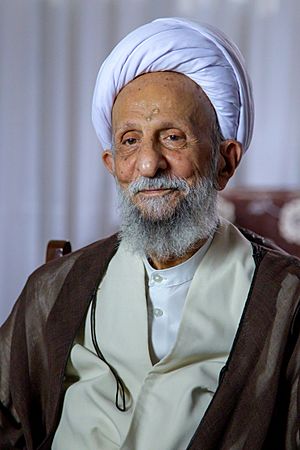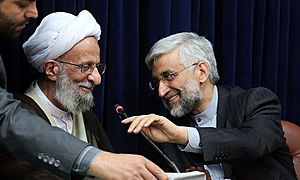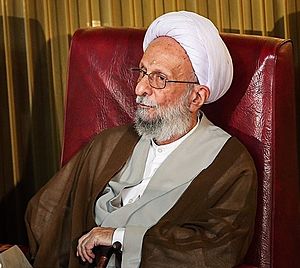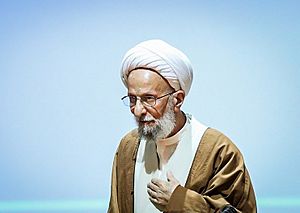Mohammad-Taqi Mesbah-Yazdi facts for kids
Quick facts for kids
Mohammad-Taqi Mesbah-Yazdi
|
|
|---|---|

Mesbah Yazdi in 2020
|
|
| Member of the Assembly of Experts | |
| In office 23 February 1999 – 23 May 2016 |
|
| Constituency | Tehran Province |
| Majority | 879,883 (23.74%; 2006) |
| In office 21 February 1991 – 22 February 1999 |
|
| Constituency | Khuzestan Province |
| Personal details | |
| Born |
Taqi Givechi
31 January 1935 Yazd, Imperial State of Persia |
| Died | 1 January 2021 (aged 85) Tehran, Iran |
| Resting place | Fatima Masumeh Shrine |
| Political party | Front of Islamic Revolution Stability (spiritual leader) |
| Other political affiliations |
Society of Seminary Teachers of Qom |
| Children | 2 sons and 1 daughter |
| Relatives | Hossein Noori Hamedani (affinal) |
| Occupation | Political activist |
| Years active | 1963–1964 1989–2021 |
| Membership | Supreme Council of the Cultural Revolution Ahl Al-Bayt World Assembly |
| Signature |  |
| Website | Official website: http://www.mesbahyazdi.ir/ |
| Theological work | |
| Religion | Islam |
| Denomination | Jaʿfari Twelver Shīʿā |
| Era | Contemporary Islamic philosophy |
| Main interests | Guardianship of the Islamic Jurist, Jihad |
| Notable ideas | Incompatibility of Islam and democracy |
| Years active | 1947–1960 (study) 1966–2021 (teaching) |
| Alma mater | Qom Seminary Hindi School, Najaf (1950) Shāfīʿiya School, Yazd (1940s) Khān School, Yazd (1940s) |
| Taught at | Qom Seminary Haghani Seminary Feyziyeh Seminary |
| Institution | Imam Khomeini Educational Research Institute (1991–2021) In the Path of God Institute (1976–2021) |
|
Influenced
Kazem Seddiqi, Morteza Agha-Tehrani, Parviz Davoudi, Gholam-Hossein Elham, Hamid Rasaee, Gary Legenhausen, Sambi
|
|
|
Influenced by
Seyyed Hossein Borujerdi, Ruhollah Khomeini, Mohammad-Taqi Bahjat Foumani, Mohammad Ali Araki, Muhammad Husayn Tabataba'i, Ahmad Fardid
|
|
Ayatollah Mohammad-Taqi Mesbah-Yazdi (born Taqi Givechi, 31 January 1935 – 1 January 2021) was an important Iranian religious leader and philosopher. He was known as a conservative political thinker. He served as the spiritual leader of a political group called the Front of Islamic Revolution Stability.
He was a member of the Assembly of Experts. This group helps choose Iran's Supreme Leader. Mesbah-Yazdi led a smaller group within this assembly. He was seen as one of the most conservative and powerful religious scholars in Qom. Qom is a major city for religious studies in Iran.
From 1952 to 1960, he studied in Qom. His teachers included Ruhollah Khomeini and Muhammad Husayn Tabataba'i. He also studied for about fifteen years with Mohammad-Taqi Bahjat Foumani. Mesbah-Yazdi supported Islamic philosophy. He believed that Iranians were moving away from religious values. He disagreed with Western-style freedom and democratic ideas.
Contents
Early Life and Education
Mesbah-Yazdi's original last name was Givechi. This name came from his ancestors who made traditional shoes called Giveh. He finished his basic schooling in Yazd at age 13. Then, he joined a religious school (seminary) in his hometown called Khān School. He also attended the Shāfīʿiya School, another seminary.
In 1950, he moved to Iraq to study at Hindi School in Najaf. His studies in Iraq lasted seven months. After that, he moved to Qom to study at Qom Seminary. There, he continued learning about fiqh (Islamic law). He studied the writings of important thinkers like Avicenna and Mulla Sadra.
His teachers included famous figures such as Ayatollah Seyyed Hossein Borujerdi and Ayatollah Ruhollah Khomeini. He also learned from Ayatollah Mohammad Taghi Bahjat Foumani and Ayatollah Allameh Tabatabaei. Allameh Tabatabaei wrote Tafsir al-Mizan, a well-known interpretation of the Quran. Mesbah-Yazdi finished his studies in 1960.
Before the 1979 Iranian Revolution, he helped other religious leaders. He worked with Mohammad Beheshti and Ali Akbar Hashemi Rafsanjani. They published two journals called "Mission of Prophet Muhammad" and "Revenge." He was in charge of all publishing for "Revenge."
Political Activities
Early Involvement (1963-1989)
Mesbah-Yazdi became active in politics in 1963. This was after the 15th of Khordad movement. These were protests against the arrest of Ayatollah Khomeini. He helped organize people and collect signatures against the Shah's White Revolution reforms.
When Khomeini was released, Mesbah-Yazdi joined other clerics in celebrating. This happened at the Feyziyeh School. He stopped his political activities before Ayatollah Khomeini went into exile in 1964. He then returned to his religious studies and teaching. He wrote books that strongly disagreed with the idea that Ali Shariati's ideas helped cause the 1979 Iranian Revolution. Mesbah-Yazdi was not very involved in politics until 1989, when Ruhollah Khomeini passed away.
Later Influence (1997-2016)
In 1997, after Mohammad Khatami became president, Mesbah-Yazdi encouraged groups like the Revolutionary Guards. He wanted them to stop reform movements, even if it meant using force.
He was later said to have supported actions against some Iranian dissidents in 1998. After the reform movement became less popular around 2003, his supporters gained more power. They won local and parliamentary elections. In 2005, Mesbah-Yazdi supported Mahmoud Ahmadinejad for president. After Ahmadinejad won, Mesbah-Yazdi's supporters were given important government jobs.
2009 Presidential Election
Mesbah-Yazdi supported Ahmadinejad in the 2009 election. He even called Ahmadinejad's win a "miracle." However, by 2011, he started to criticize Ahmadinejad. He said Ahmadinejad was acting "unnaturally" and needed help. When Ahmadinejad fired the intelligence minister without asking Ali Khamenei, Mesbah-Yazdi spoke out. He said it was not logical for a politician to upset his closest friends.
Assembly of Experts Role
Some people believed Mesbah-Yazdi wanted to become the next Supreme Leader after Khamenei. Some religious leaders and newspapers worried he was trying to get his supporters into the Assembly of Experts. In 2006, one of his close associates was put in charge of the election for the Assembly of Experts. Many candidates in the 2006 Iranian Assembly of Experts election were loyal to Mesbah-Yazdi. However, his group did not win a majority in that election. This left the assembly mostly in the hands of more moderate conservatives. Mesbah-Yazdi himself won a seat but was not among the top winners. In the 2016 Iranian Assembly of Experts election, he was not re-elected.
Career and Teachings


Mesbah-Yazdi believed that the way religious schools (hawza) taught should change. His idea was approved by Seyyed Hossein Borujerdi. So, he and Mohammad Beheshti started the Haghani School in Qom. This school aimed to train future leaders for Iran. Mesbah-Yazdi was close to Ayatollah Mohammad Beheshti. Beheshti was a key figure who was assassinated in 1981. The Haghani School is very important. It has been called a "school for the Islamic Republic's leaders." Its graduates often work in important political and security roles in Iran.
Mesbah-Yazdi wrote many books. These books cover topics like Islamic law (fiqh), interpretations of the Quran, and general Islamic issues. His book "Amuzesh-e Falsafeh" (Philosophical Instructions) is widely used. It is taught in philosophy classes at Qom's religious schools. This book covers similar ideas to Allameh Tabatabaei's works. "Amuzesh-e Falsafeh" has also been translated into English.
He also published a weekly newspaper called Parto Sokhan. He was the director of the Imam Khomeini Education and Research Institute in Qom. This institute was founded in 1995. He was a member of the Iranian Assembly of Experts from 1991 to 2016.
After the 1997 presidential election, the political atmosphere became more open. During this time, Mesbah-Yazdi's students became known for criticizing President Mohammad Khatami. This made Mesbah-Yazdi's name appear more often in the news. He supported Mahmoud Ahmadinejad's successful presidential campaign. However, he later criticized Ahmadinejad.
His Views
Mesbah-Yazdi was seen as a key thinker for radical groups in Iran. He strongly disagreed with Western culture. He felt that if someone criticized freedom and democracy today, they would face serious problems. He believed that "Zionists" were the main source of evil in the world.
In a 2005 book, Mesbah-Yazdi reportedly called for Iran to produce "special weapons." This was a hidden way of talking about nuclear arms.
Mesbah-Yazdi wanted Iran to return to the values of the 1979 Iranian Revolution. He believed that an "Islamic republic" was a confusing idea. He thought that in a truly Islamic government, elections were only for people to show loyalty to the supreme religious leader. He did not think elections should be about choosing between different leaders or policies. He believed the "republican part" of Iran's government was a compromise. He felt it should be removed to show the true "Islamic system." He was quoted saying, "It doesn't matter what the people think. The people are ignorant sheep."
Mesbah-Yazdi was also strongly against the Reformist movement in Iran. He believed an Islamic government must "fight" it. He compared new reform ideas in Islam to "injecting the Aids virus!" He also claimed that young Iranians who questioned the government after studying abroad were trained in "psychological warfare" by foreign universities. President Khatami once called him "the theoretician of violence."
In 2005, he issued a religious ruling (fatwa) telling Iranians to vote for Mahmoud Ahmadinejad. Ahmadinejad was a former student and close associate of his. They reportedly met weekly.
Like many important Shia clerics, he supported taking the Quran and religious stories (hadith) very literally. Ayatollah Mesbah-Yazdi was against bida'a, or new ideas in religion. He believed this included new ways of understanding the Sunnah and Qur'an. He was quoted saying, "If someone tells you he has a new interpretation of Islam, sock him in the mouth."
Personal Life
He married his wife, who was from Ayatollah Hossein Noori Hamedani's family, in the 1950s. They had three children: two sons and one daughter. Both of their sons became religious scholars. One of them studied at McGill University in Montreal, Quebec, Canada. Their daughter is married to Hujjat al-Islam Mohammadi Araghi. He led the "Islamic Culture and Communication Organization." This is a part of the Ministry of Culture and Islamic Guidance.
See also
- Mahmoud Ahmadinejad
- Abbasali Amid Zanjani
- History of fundamentalist Islam in Iran
- List of Ayatollahs


